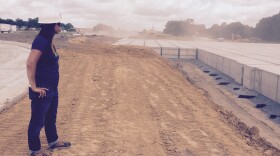The U.S. Senate has authorized $35 million to create new housing for homeless military veterans on the Department of Veterans Affairs' campus in Westwood, California.
With more homeless veterans than any other city in the U.S., Los Angeles has been scrambling for ways to house those in need. Last year, under a settlement agreement, the V.A. agreed to repurpose the campus to help house homeless veterans.
Veterans had sued the V.A., claiming misuse of the property, which was donated to the federal government to serve those who served in the military. Instead, large sections of the campus were leased out to businesses and nonprofits who had nothing to do with veterans.
A draft Master Plan for the campus includes permanent housing for 900 veterans and transitional housing for an additional 700. That plan has not yet been finalized.
The $35 million would provide earthquake retrofits to a building that could house about 65 veterans--making the price tag more than a half million dollars per bed.
Seems steep--and the V.A. has acknowledged that demolishing the historic buildings that litter the campus and erecting new ones would be much cheaper. But the process for doing so is much slower, particularly since the government believes the existing buildings have historical value.
"The campus has a number of beautiful old buildings, that are outdated and underutilized," said Milo Peinemann of New Directions, a non-profit organization that works to house homeless veterans.
But they're not seismically fit. Some buildings on the campus still have unfixed damage from the 1971 Sylmar Quake.
"The next big California earthquake is a question of when, not if," Senator Dianne Feinstein, who authored the $35 million bill, said in a statement. "These projects are also critical to meeting health care and housing needs for veterans throughout California."
Peinemann said the need is great.
"Right now there's such a desperate shortage of housing for homeless veterans," he said. "This would bring housing to the campus using the existing buildings."
The House of Representatives must still approve the bill. If passed, it would be the third such project on campus. The first, Building 208 opened last year. Funding has already been approved for work on a second, Building 205.





